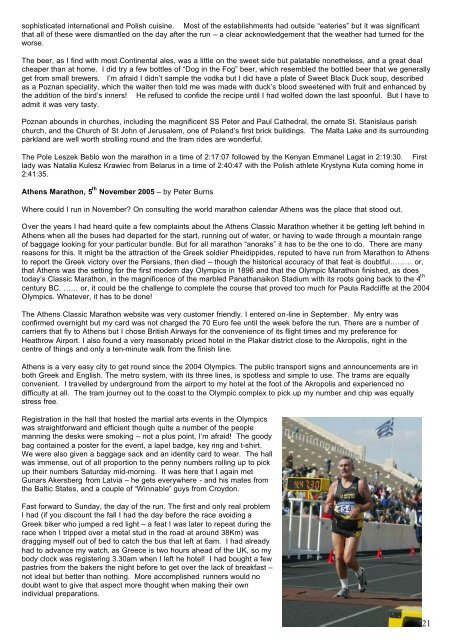100 Marathon Club
100 Marathon Club
100 Marathon Club
You also want an ePaper? Increase the reach of your titles
YUMPU automatically turns print PDFs into web optimized ePapers that Google loves.
sophisticated international and Polish cuisine. Most of the establishments had outside “eateries” but it was significant<br />
that all of these were dismantled on the day after the run – a clear acknowledgement that the weather had turned for the<br />
worse.<br />
The beer, as I find with most Continental ales, was a little on the sweet side but palatable nonetheless, and a great deal<br />
cheaper than at home. I did try a few bottles of “Dog in the Fog” beer, which resembled the bottled beer that we generally<br />
get from small brewers. I’m afraid I didn’t sample the vodka but I did have a plate of Sweet Black Duck soup, described<br />
as a Poznan speciality, which the waiter then told me was made with duck’s blood sweetened with fruit and enhanced by<br />
the addition of the bird’s inners! He refused to confide the recipe until I had wolfed down the last spoonful. But I have to<br />
admit it was very tasty.<br />
Poznan abounds in churches, including the magnificent SS Peter and Paul Cathedral, the ornate St. Stanislaus parish<br />
church, and the Church of St John of Jerusalem, one of Poland’s first brick buildings. The Malta Lake and its surrounding<br />
parkland are well worth strolling round and the tram rides are wonderful.<br />
The Pole Leszek Beblo won the marathon in a time of 2:17:07 followed by the Kenyan Emmanel Lagat in 2:19:30. First<br />
lady was Natalia Kulesz Krawiec from Belarus in a time of 2:40:47 with the Polish athlete Krystyna Kuta coming home in<br />
2:41:35.<br />
Athens <strong>Marathon</strong>, 5 th November 2005 – by Peter Burns<br />
Where could I run in November? On consulting the world marathon calendar Athens was the place that stood out.<br />
Over the years I had heard quite a few complaints about the Athens Classic <strong>Marathon</strong> whether it be getting left behind in<br />
Athens when all the buses had departed for the start, running out of water, or having to wade through a mountain range<br />
of baggage looking for your particular bundle. But for all marathon “anoraks” it has to be the one to do. There are many<br />
reasons for this. It might be the attraction of the Greek soldier Pheidippides, reputed to have run from <strong>Marathon</strong> to Athens<br />
to report the Greek victory over the Persians, then died – though the historical accuracy of that feat is doubtful……… or,<br />
that Athens was the setting for the first modern day Olympics in 1896 and that the Olympic <strong>Marathon</strong> finished, as does<br />
today’s Classic <strong>Marathon</strong>, in the magnificence of the marbled Panathanaikon Stadium with its roots going back to the 4 th<br />
century BC. …… or, it could be the challenge to complete the course that proved too much for Paula Radcliffe at the 2004<br />
Olympics. Whatever, it has to be done!<br />
The Athens Classic <strong>Marathon</strong> website was very customer friendly. I entered on-line in September. My entry was<br />
confirmed overnight but my card was not charged the 70 Euro fee until the week before the run. There are a number of<br />
carriers that fly to Athens but I chose British Airways for the convenience of its flight times and my preference for<br />
Heathrow Airport. I also found a very reasonably priced hotel in the Plakar district close to the Akropolis, right in the<br />
centre of things and only a ten-minute walk from the finish line.<br />
Athens is a very easy city to get round since the 2004 Olympics. The public transport signs and announcements are in<br />
both Greek and English. The metro system, with its three lines, is spotless and simple to use. The trams are equally<br />
convenient. I travelled by underground from the airport to my hotel at the foot of the Akropolis and experienced no<br />
difficulty at all. The tram journey out to the coast to the Olympic complex to pick up my number and chip was equally<br />
stress free.<br />
Registration in the hall that hosted the martial arts events in the Olympics<br />
was straightforward and efficient though quite a number of the people<br />
manning the desks were smoking – not a plus point, I’m afraid! The goody<br />
bag contained a poster for the event, a lapel badge, key ring and t-shirt.<br />
We were also given a baggage sack and an identity card to wear. The hall<br />
was immense, out of all proportion to the penny numbers rolling up to pick<br />
up their numbers Saturday mid-morning. It was here that I again met<br />
Gunars Akersberg from Latvia – he gets everywhere - and his mates from<br />
the Baltic States, and a couple of “Winnable” guys from Croydon.<br />
Fast forward to Sunday, the day of the run. The first and only real problem<br />
I had (if you discount the fall I had the day before the race avoiding a<br />
Greek biker who jumped a red light – a feat I was later to repeat during the<br />
race when I tripped over a metal stud in the road at around 38Km) was<br />
dragging myself out of bed to catch the bus that left at 6am. I had already<br />
had to advance my watch, as Greece is two hours ahead of the UK, so my<br />
body clock was registering 3.30am when I left he hotel! I had bought a few<br />
pastries from the bakers the night before to get over the lack of breakfast –<br />
not ideal but better than nothing. More accomplished runners would no<br />
doubt want to give that aspect more thought when making their own<br />
individual preparations.<br />
21


